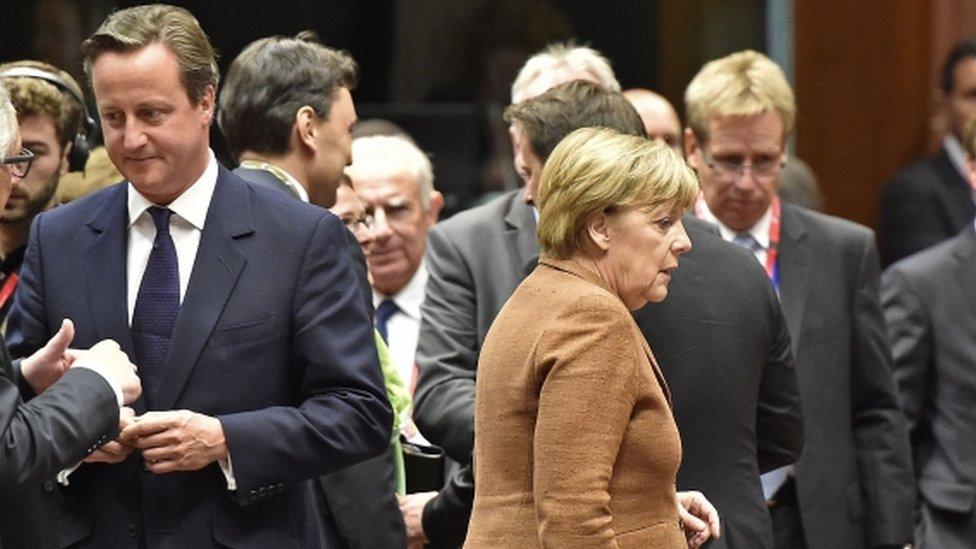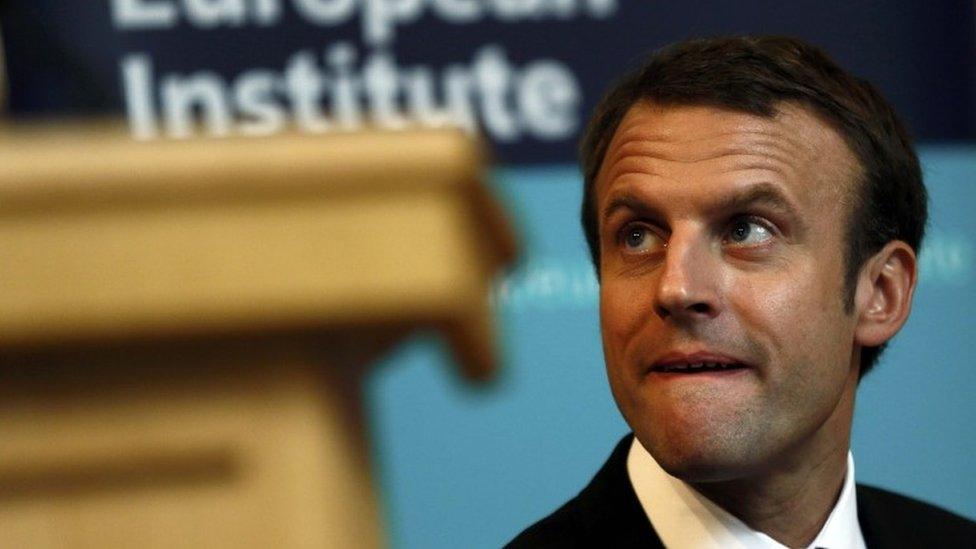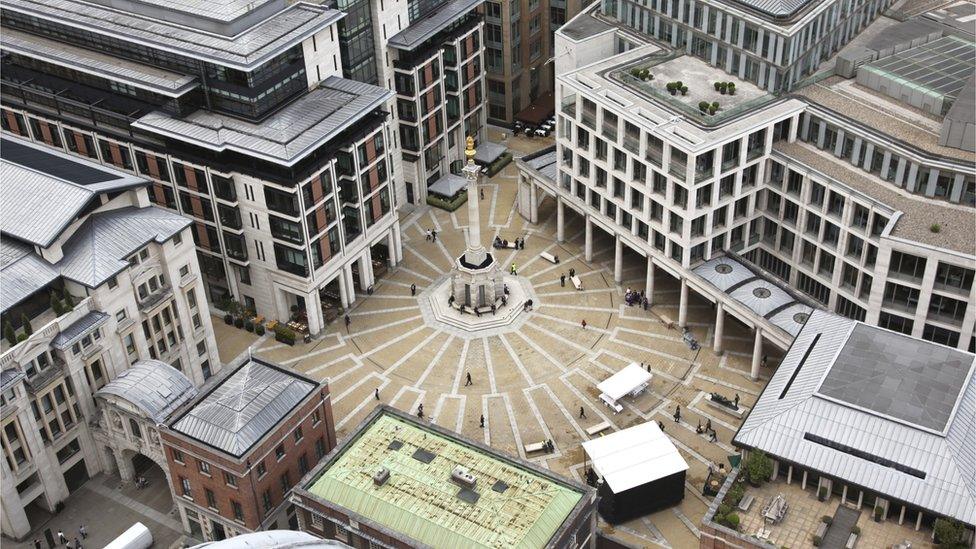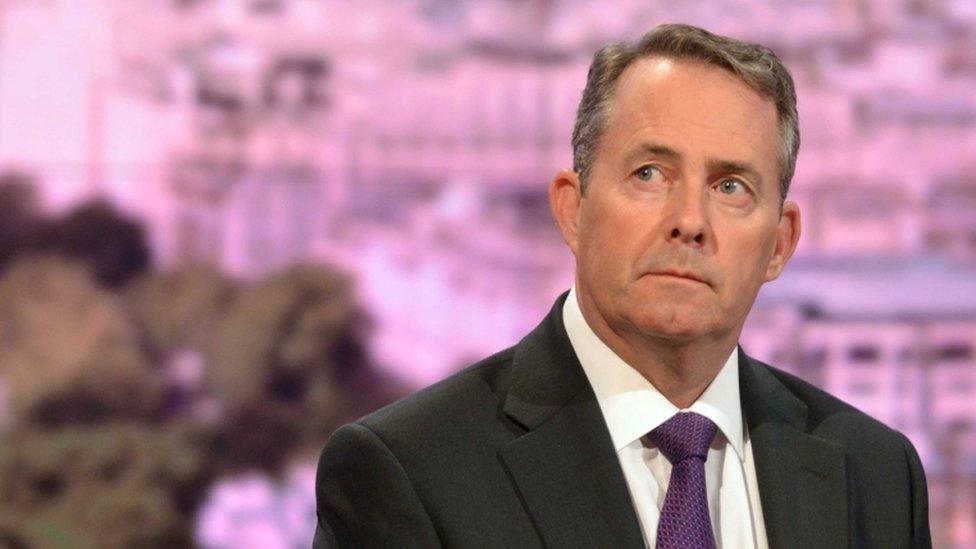What does Britain want from the EU?
- Published

Are the UK and Germany facing different ways on Europe?
In the capitals of Europe and in Brussels, there is frustration at what they see as British shadow-boxing.
A renegotiation of Britain's membership of the EU is under way - or so they are told - but they don't know what the government at Westminster really wants.
The European mood was summed up, external by the French Economy Minister, Emmanuel Macron, during his recent visit to London.
"We need," he said, "a precise proposal… you have to say what you need."
You hear similar comments in Paris and Brussels.
They want to see a document. They are impatient for a proper proposal that sets out British aims.
Everywhere are signs of a great debate on hold.
The British Chambers of Commerce said that "business people want more clarity", external.
In the meantime, half of its members are undecided whether the UK should stay in the EU.
In the vacuum, public opinion seems to be shifting against staying in the EU.
For several months, there have been trips to European capitals by the prime minister and the chancellor.
But they are described as "probes", preparing the ground.
Certainly the focus of talks in Brussels has been on technical and legal issues.
But for ministers such as Mr Macron, the strategy is the wrong way round. The French want to see the proposal first.
"The question," he said, "is not about how, but what."
The strategy of not sharing anything on paper is, of course, deliberate.
There is the legitimate fear of leaks.
Pockets of opposition
The government is wary of allowing pockets of opposition to build before the real negotiations have started.
In particular, they want to avoid the Conservative conference scrapping over the proposals.

Emmanuel Macron wants to see precise proposals
The government's plan is to wait until after the Polish elections, external on 25 October, which will be an important indicator of how the migrant crisis is changing European politics.
After that, the expectation is that a substantive document will be on the table in time for the European Summit in December.
The plan would be to reach an agreement by March next year, with a view to holding the referendum by the autumn of 2016.
Already some ministers believe that timetable is too ambitious.
So what does the government want?
At the outset David Cameron defined his project as a negotiation for "fundamental change." That now appears a high ambition.
The government seems to have settled on five basic demands:
more power for national parliaments over EU decisions
to safeguard the City and the single market from eurozone countries banding together and outvoting countries not in the euro bloc
to restrict the rights of EU migrants to claim some benefits in the UK
for an opt-out from the ambition of "ever-closer union"
for a reduction in red tape and bureaucracy
Some of these can be more easily delivered than others.
The commission is already committed to less regulation.
Last June, the European Council described the words "ever closer union" as "allowing for different paths of integration for different countries"., external
It was wording with British fingerprints very much on it.
There is already a mechanism for national parliaments to put a brake on legislation.
The two remaining demands are much tougher.
Restricting benefits to EU migrants risks undermining the principle of free movement of labour and would be judged discriminatory.
It may just be possible to apply a residence qualification that would apply to British nationals and non-nationals alike.
In the government's favour are a cluster of other countries that do not believe that freedom of movement should be "freedom to claim social benefits".
City protection
Finally, protecting the City and the single market from being outvoted by eurozone countries.
There is suspicion on both sides. The French and the Germans have long believed that the UK wants an optout for the City, and they won't agree to that.
The fear in the UK is that the euro countries would use their majority to vote for rules that harmed the City and the single market.

The government wants to protect the position of the City of London
The UK points to a recent decision to use a fund that Britain contributes to in order to give a bridging loan to Greece even though Britain had negotiated an exemption.
As Charles Grant, from the Centre for European Reform, says: "The British government has not convinced many of its partners that its concerns about the relationship between the euro and the single market are justified."
Even if these negotiations were successful, there would be a minefield of problems.
Would they amount to a "fundamental change" in the UK's relationship with the EU?
Would voters see it that way? What would be the big headline that could sway a referendum? Will the government speak with one voice?

Conservative manifesto 2015:
We will let you decide whether to stay in or leave the EU. We will legislate in the first session of the next Parliament for an in-out referendum to be held on Britain's membership of the EU before the end of 2017.
We will protect our economy from any further integration of the eurozone. We will not let the integration of the eurozone jeopardise the integrity of the single market or in any way disadvantage the UK.
We will reclaim powers from Brussels. We want national parliaments to be able to work together to block unwanted European legislation. And we want an end to our commitment to an "ever closer union".
We will scrap the Human Rights Act and introduce a British bill of rights.
We will take action in Europe to make you better off. We want to expand the single market, breaking down the remaining barriers to trade and ensuring that new sectors are opened up to British firms.

Other European leaders are uncertain as to how hard David Cameron will fight to stay in the EU.
There is a significant section of his party who believe that as prime minister he should remain neutral.
The view in Brussels is that it is essential that David Cameron campaigns not just on the detail of the renegotiation but on his conviction that Britain's future lies with the European project.
Here is the prime minister's dilemma: for the "stay" side to win, they need David Cameron to become the great persuader.
But the harder he campaigns, the greater the risk he will split his own party.
Some Conservative MPs are putting down markers.
Liam Fox says, external: "Any deal that is worth its salt will require treaty change. If our negotiation requires treaty change, then we must have it before the referendum takes place."
Even though treaty change will eventually be necessary to support further integration of the eurozone, it won't happen before 2017.
Unfeasible demands
Anand Menon, director of UK in a Changing Europe, external, says: "Treaty change is simply not feasible within the timeframe set by the PM, not least because so many member states are opposed to undertaking such a process."

Dr Liam Fox says treaty change is essential
So the government may have to fall back on getting binding commitments, but many MPs will be sceptical that you can bind future governments.
One other factor in the government's calculations is the migrant crisis.
On the one hand, it might just persuade other EU countries to settle with Britain in the face of a much bigger crisis.
On the other hand, voters could be turned off by an EU that has lost control of its borders.
The latest polls indicate that over the summer the mood has moved against staying, external in the EU.
But sooner rather than later the government will have to publish its plan to fundamentally change the UK's relationship with the EU - and that moment is approaching fast.